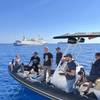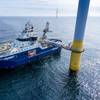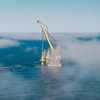Arctic Risk Management Study Released by DNV & FNI
A new study about crucial risk management issues relating to Arctic operations is released by DNV and the Fridtjof Nansen Institute (FNI).
The study concludes that, in order to safely develop Arctic resources, there is a need for improved technology, oil spill preparedness and close cooperation between the authorities, industry and society. DNV’s CEO, Dr Henrik O. Madsen, presented the study entitled ‘Energy and the environment – Arctic resource development, risks and responsible management’ at the Offshore Northern Seas (ONS) Conference in Stavanger.
Some of the study’s conclusions:
- Interest in the Arctic is growing rapidly, but there is no race for resources. The Arctic is more characterised by cooperation than by conflict. It is in the interests of all major stakeholders that the rules of the game are followed, meaning adherence to the law of the sea and cooperation through international bodies such as the Arctic Council.
- Some areas of the Arctic are still disputed, but the prospects for a solution without conflict are good. The bulk of Arctic resources are clearly and unambiguously under the national jurisdictions of the five Arctic coastal states: Russia, Norway, the USA, Canada and Denmark/Greenland.
- The Arctic represents an energy and climate paradox. The effects of climate change are dramatic in the Arctic and are showing the world the importance of bringing global warming under control. At the same time, it is climate change that, by melting sea ice, is opening up the Arctic for further petroleum exploration.
- Some of the greatest challenges to the development of energy resources in the more demanding regions of the Arctic are the risks of accidents, loss of life and potentially uncontrollable oil spills, especially in ice-covered areas. Thus, not only is effort needed to prevent accidents from happening, but systems also need to be developed to handle emergencies.
- The management of these challenges requires more knowledge, better technology and good, close and transparent cooperation between the authorities, industry and society.
DNV’s CEO Dr Henrik O. Madsen discusses the study’s findings concerning international conflicts, institutional architecture, environmental challenges, resources and regulations relating to fishery, shipping and petroleum activities and finally concerning risk management in the Arctic, and his presentation can be viewed here.











